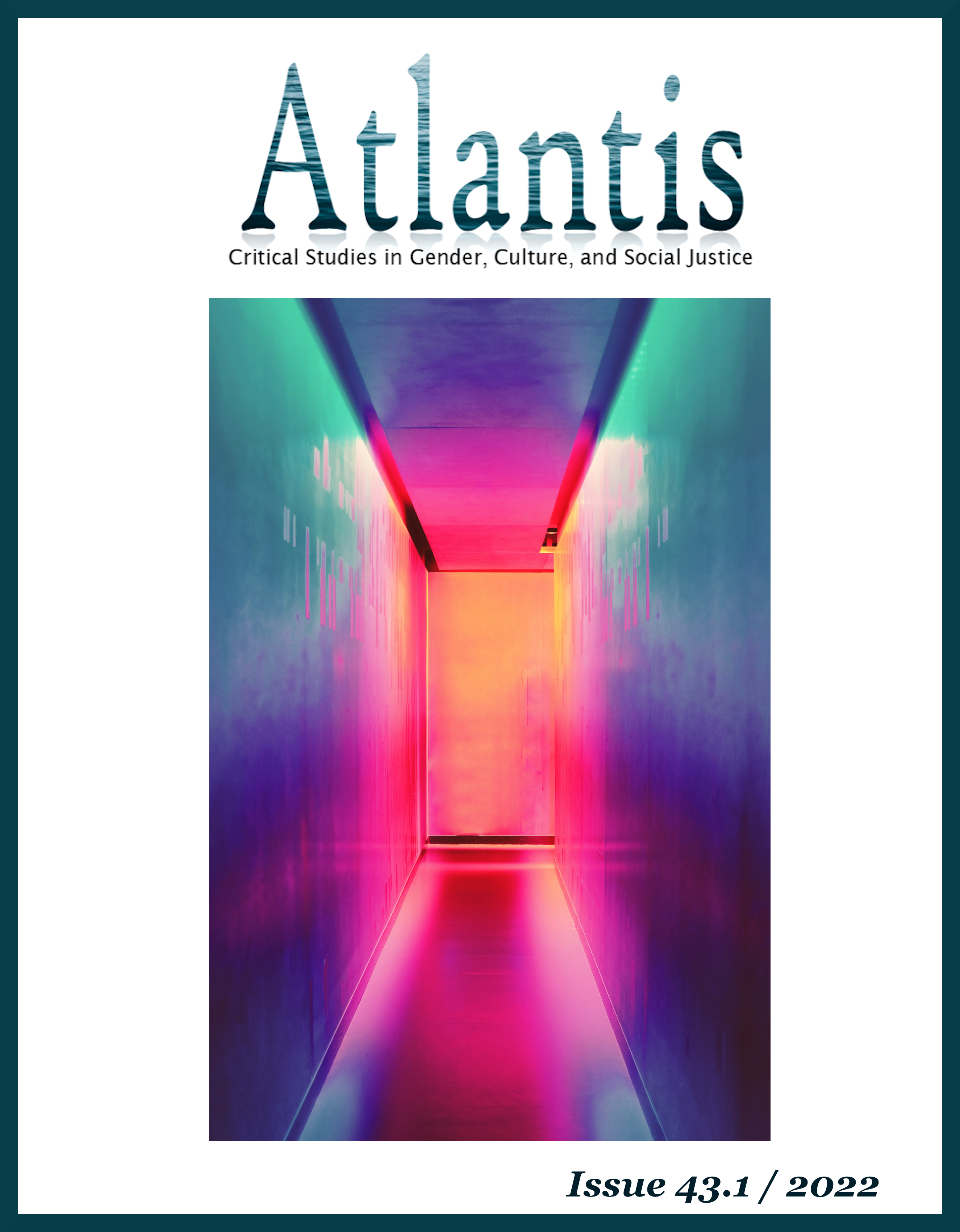« J’aimerais que ma mère soit là » : un rapport auto-ethnographique sur la violence obstétricale dans les services de santé au Mexique
Mots-clés :
avortement, auto-ethnographie, violence obstétricale, droits génésiquesRésumé
Cet article propose un récit de violence obstétricale lors de procédures d’avortement au sein du système de santé mexicain. Au moyen de l’auto-ethnographie, l’auteure raconte et analyse son expérience personnelle afin de déterminer les implications sociales et politiques, ainsi que les intersections de genre et de classe sociale qui existent dans les soins abortifs financés par l’État. L’importance de cette question émane de l’émergence et du raffermissement de la lutte féministe dans la conquête des droits génésiques à la fois au Mexique et dans d’autres pays d’Amérique latine. En raison de sa rédaction auto-ethnographique, cet article discute du stress qui subsiste lorsque la décriminalisation de l’avortement, un objectif primordial du mouvement féministe, ne garantit pas que les femmes subissent cette intervention dans des conditions exemptes de violence, puisque la stigmatisation entourant l’avortement pourrait toujours prévaloir.
Références
Ariza Sosa, Gladys Rocío. 2013. “Las representaciones sociales de la violencia en las relaciones de pareja en Medellín en el siglo XXI.” Revista CES Psicología 6 (1): 134-158. https://www.redalyc.org/pdf/4235/423539419009.pdf
Bedoya-Ruiz, Libia, Andrés Agudelo-Suárez, and Diego Restreopo-Ochoa. 2020. “Mujeres en embarazo, parto y posparto: una mirada desde el pensamiento feminista.” Revista Peruana de Medicina Experimental y Salud Publica 37, (1): 142-147. https://dx.doi.org/10.17843/rpmesp.2020.371.4981
Coon, Tamara. 2013. “The Transition to Nonparenthood: A Critical Feminist Autoethnographic Approach to Understanding the Abortion Experience.” Journal of Poetry Therapy 26, (3): 169-189. http://dx.doi.org/10.1080/08893675.2013.823314
Ellis, Carolyn and Arthur P. Bochner. 1991. “Telling and Performing Personal Stories: The Constraints of Choice in Abortion.” In Investigating Subjectivity: Research on Lived Experience, edited by Carolyn Ellis and Michael Flaherty, 79-101. Thousand Oaks: CA: Sage
Ellis, Carolyn, Tony E. Adams, and Arthur P. Bochner. 2010. “Autoethnography: An Overview.” Forum Qualitative Sozialforschung / Forum: Qualitative Social Research 12 (1). https://doi.org/10.17169/fqs-12.1.1589.
Grupo de Información en Reproducción Elegida (GIRE). 2021. “¿Qué es la marea verde? ¿Y el pañuelo?” Accessed October 10, 2021. https://gire.org.mx/limon/que-es-la-marea-verde-y-el-panuelo/
Grupo de Información en Reproducción Elegida (GIRE). 2018. Justicia Reproductiva. México: GIRE
Holman Jones, Stacy, Tony E. Adams, and Carolyn Ellis. 2016. “Introduction: Coming to Know Autoethnography as More than a Method.” In Handbook of Autoethnography, edited by Stacy Holman Jones, Tony E. Adams, and Carolyn Ellis, 17-47. New York: Routledge.
hooks, bell. 2000. Feminism Is For Everybody. Passionate Politics. Massachusetts: South End Press.
Kumar, Anuradha, Leila Hessini and Ellen M.H. Mitchell. 2009. “Conceptualising Abortion Stigma.” Culture, Health & Sexuality 11, (6): 625-639. https://doi.org/10.1080/13691050902842741
Metta, Marilyn. 2016. “Putting the Body on the Line. Embodied Writing and Recovery through Domestic Violence.” In Handbook of Autoethnography, edited by Stacy Holman Jones, Tony E. Adams, and Carolyn Ellis, 486-509. New York: Routledge.
Swafford, Shelby. 2020. “To be a (M)other: A Feminist Performative Autoethnography of Abortion.” Cultural Studies <-> Critical Methodologies, 20 (2): 95-103. https://doi.org/10.1177/1532708619878743
Tamayo, Juliana, Clara Restrepo, Laura Gil, and Cristina González. 2015. Obstetric Violence and Abortion. Contributions to the Debate in Colombia. Colombia: Grupo Médico por el derecho a decidir.
Women Help Women. 2017. Violencia obstétrica y aborto. Ideas sobre autodefensa para mujeres que han decidido abortar. Venezuela, Honduras, Dominican Republic, Chile: WHW
World Health Organization. 2021. “Abortion.” Last modified November 25, 2021. https://www.who.int/news-room/fact-sheets/detail/abortion
Téléchargements
Publié
Numéro
Rubrique
Licence
© Estefanía Díaz 2022

Cette œuvre est sous licence Creative Commons Attribution 4.0 International.
Les auteurs qui publient dans cette revue acceptent les conditions suivantes:
1. Les auteurs conservent les droits d’auteur et accordent le droit de première publication à la revue. L’œuvre est simultanément sous licence internationale Creative Commons Attribution 4.0 qui permet à d’autres personnes de la partager en citant dans les remerciements l’auteur de l’œuvre et sa publication initiale dans cette revue.
2. Les auteurs savent que les articles publiés dans Atlantis sont indexés et disponibles par le biais de divers outils de recherche universitaires et professionnels, y compris, entre autres, Erudit.
3. Les auteurs peuvent conclure des ententes contractuelles supplémentaires et distinctes pour la distribution non exclusive de la version de l’article publiée par la revue (c’est-à-dire, l’afficher dans un dépôt institutionnel ou la publier dans un livre), en signalant qu’elle a été initialement publiée dans cette revue.
4. Les auteurs sont autorisés et encouragés à prépublier leur œuvre, c’est-à-dire à la publier en ligne (dans un dépôt institutionnel ou sur leur site Web, par exemple) avant et pendant le processus de soumission. Cela peut conduire à des échanges productifs, ainsi qu’à ce que le travail publié soit cité plus tôt et plus souvent. Renseignez-vous davantage ici sur la prépublication.







